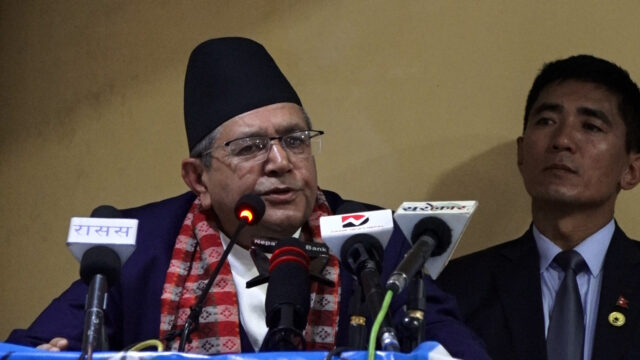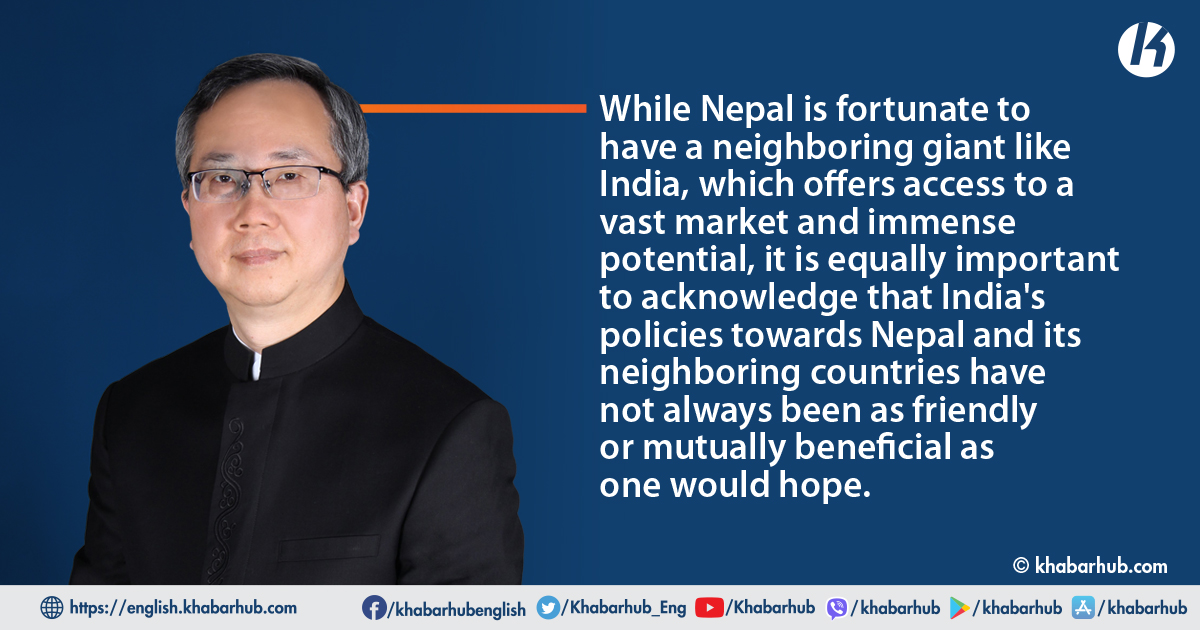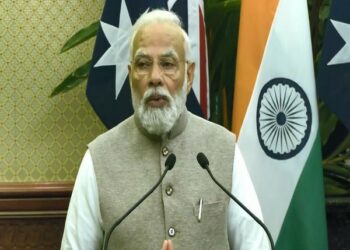KATHMANDU: In a departure from diplomatic conventions that drew attention, Chinese Ambassador to Nepal, Chen Song, seized the moment to underscore China’s economic development, simultaneously suggesting that Nepal and other nations may have lagged in formulating timely policies to achieve similar success.
He also expressed concerns about India’s relationship with Nepal, describing it as “less than ideal” at times.
In a program held at a hotel in Kathmandu’s New Baneswor on Saturday in the presence of Speaker of the House of Representatives, Devraj Ghimire, Ambassador Chen emphasized the untapped potential within Nepal’s agriculture sector and lamented the country’s failure to enact timely policies, which have impeded its development in this critical domain.
Speaking about what he said “India’s influence on Nepal”, Ambassador Chen recognized India’s vast market potential but advised Nepal to navigate its relationship with India cautiously, given certain policy constraints.
“While Nepal is fortunate to have a neighboring giant like India, which offers access to a vast market and immense potential, it is equally important to acknowledge that India’s policies towards Nepal and its neighboring countries have not always been as friendly or mutually beneficial as one would hope. This presents a set of policy constraints that need to be addressed,” he pointed out.
In fact, he initiated the discussion by addressing Nepal’s electricity trade deficit, pointing out that while Nepal exported electricity worth Rs 10 billion to India in the last fiscal year, it imported electricity worth Rs 19 billion from India.
He stated that this highlighted a substantial imbalance in electricity trade.
Ambassador Song had stated that Nepal imported cereals worth Rs 7 billion from India within the first month of the current fiscal year, underscoring Nepal’s heavy reliance on agricultural imports from its neighboring country.
Commenting on Ambassador’s remarks, Foreign affairs expert and former Ambassador to Denmark, Vijay Kant Karna, criticized the statement as “undiplomatic.”
“He (Song) has displayed an undiplomatic demeanor,” Karna conveyed to Khabarhub, further asserting that, “China, much like during the Millennium Challenge Corporation (MCC) episode, has meddled in Nepal’s internal affairs.”
“It seems that he (Ambassador Song) seriously lacked the figure of import and export,” Karna said.
In light of these challenges, Ambassador Chen urged the Nepali government to prioritize its agricultural sector and stressed its paramount importance.
He also drew attention to the decline in Nepal’s manufacturing sector, which has shrunk from 14 percent of GDP to below 10 percent, emphasizing that Nepal currently depends on imports for most industrial products.

While acknowledging concerns within Nepal about the trade deficit with China, Ambassador Chen expressed China’s willingness to support Nepalese exports, provided Nepal improves its capacity to produce high-quality agricultural and industrial goods.
When Nepal government formulates your economic policies, you have to take your decisions under those circumstances.
Former Ambassador Karna accused Chinese Ambassador Song of attempting to “maneuver between Nepal and India” through his “groundless and fabricated” remarks.
“In reality, his statements and actions constitute a direct intrusion into Nepal’s sovereignty, which is utterly unacceptable,” he emphasized, highlighting that Ambassador Song possesses no authority to pass judgment on Nepal’s relationships with neighboring and friendly nations.
Karna also advocated for the Ministry of Foreign Affairs (MoFA) to summon Ambassador Song and request an explanation for his “irresponsible” statement.
He further recommended that political leaders and parliamentarians should speak out against Ambassador Song’s comments and take the matter seriously.
Meanwhile, foreign affairs expert Arun Kumar Subedi asserts, “This serves as a glaring example of China’s transition from conventional diplomacy to a hyperactive diplomatic approach.”
“The traditional diplomatic relations Nepal maintained with China have largely waned, as China has aggressively pursued its ‘hyperactive diplomacy’ in Nepal since President Xi Jinping’s second term,” Subedi, who is also the Advisor to former Prime Minister Sher Bahadur Deuba, observed.
Highlighting the vast potential in Nepal’s agriculture sector, Ambassador Chen urged timely policy formulation, drawing parallels with China’s history.
He noted that China initially focused on equitable resource distribution among its population before transitioning to a more open economy.
Meanwhile, Ambassador Chen pointed out that China’s current policy aims to upgrade its industries and break free from the middle-income trap.
Emphasizing China’s commitment to global engagement, Ambassador Chen showcased the Belt and Road Initiative (BRI) as a means to foster economic growth in developing nations and encouraged Nepal to learn from China’s development model and adapt its economic structure accordingly.
Subedi reiterated his critique of four misconceptions propagated by China regarding Nepal’s internal discord, particularly rooted in its traditional culture and religion.
Ambassador Chen delved into China’s past economic challenges, attributing its closed economic model to external factors such as sanctions from the United States and the USSR.
He underscored the necessity of tailoring an economic model to suit a country’s unique circumstances.
Ambassador Chen dispelled misconceptions about China’s economic growth, highlighting the importance of a robust social structure, strong agricultural and industrial sectors, and a solid educational foundation for economic success.
In conclusion, Ambassador Chen discussed the weaknesses within Nepal’s agricultural sector, highlighting its transition from an agricultural-exporting nation to one heavily reliant on agricultural imports from India.
He expressed his dedication to working towards Nepal’s benefit, acknowledging that his perspectives may evolve as he continues to explore potential cooperation between China and Nepal during his tenure in Nepal.
“China’s approach to diplomacy with Nepal underwent a transformation during Xi’s second term in office,” Subedi commented, while emphasizing, “Nepal should align itself with the global democratic community.”
Subedi reiterated his critique of four misconceptions propagated by Communists regarding Nepal’s internal discord, particularly rooted in its traditional culture and religion.
“It has been ingrained in the collective Nepali consciousness that the hindrance to Nepal’s progress lies in its traditional Hindu practices,” Subedi pointed out.
Subedi further noted that the second narrative that the communist powers have disseminated is the portrayal of those who contribute to Nepal’s GDP through capital investment, taxation, and infrastructural development as internal adversaries.
Another prevalent narrative revolves around the influence of the ‘International Democratic Community,’ encompassing Indian expansionism and the enduring presence of American imperialism.
These four misconceptions disseminated by China have significantly influenced our foreign and economic policies, often to our disadvantage. Here’s the video recording of Ambassador Song:
Following is the Chinese Ambassador Chen Song’s speech:
China, the growth, our future is bright and we want to benefit all the developing countries, especially our Nepalese friends.
So my suggestion to the Nepalese friends is that your economic structure needs restructuring.
When you do that, you need to put an eye on the Chinese economic structures and incorporate the economic structure more with Chinese economic structures.
And what are the lessons we can learn from our China’s development and what is the implications for Nepal? I thank you again for Dr. Rokaya for your wonderful presentation.
They prepared a speech for me today, but I think since the chairman asked me to comment on the presentations by Dr. Rokaya, so I will probably leave my speech for you to read.
I will comment a little bit on the presentations. I think Dr. Rokaya is very right about the division of three stages of China’s development. But there are some misunderstandings about China’s economic structures.
For example, the new China was founded in 1949. Now the notion is that China chooses to adopt a closed economic structure.
That closed economic structure is not chosen by China. It’s because of the sanctions by the US and after a few years, sanctions by the USSR- the two largest, most powerful countries and the largest economy in the world. So China has to develop itself in a closed economic model. That’s not by choice, that’s by force.
But every country like Nepal and China, you have to develop the economy under certain given circumstances.
For example, Dr. Rokaya shared an example of India’s monopoly on the salt trade with Nepal. That is a reality.
When Nepal develops its own economic policies, you have to take that into consideration.
Unfortunately, you have a neighbor like India, but fortunately you have a neighbor like India, because India is a huge market, huge potential you can tap into. But at the same time, India’s policy towards Nepal and other neighbors are not so friendly and not so beneficial to Nepal. So that is we call that policy constraints.
When Nepal government formulates your economic policies, you have to take your decisions under those circumstances.
Another misunderstanding is about after 1978. It sounds like it’s a miracle. When China opened the door, the economy will grow at unprecedented speed.
It seems to everybody that you just need to open the door, then the economic growth will come, the investment will come.
That has neglected the fact that before China opening the door, for two decades, we have consolidated our education, our Medicare systems, our industrial basis, our agricultural sector, and also we have created a more equal social structure in China.
After the independence of China, for two decades, we have placed the foundation for economic soaring.
So it’s not because of the opening of the door of China that China’s economy is booming.
It’s because we have very solid foundation, because almost at the same time, India also opened its door, but we did not see any economic booming in India. Only after recent years, we see that India’s economy is starting to soar. So that is another misunderstanding about China.
It seems like if you have an opening policy, if you have special economic zones, your economy will grow naturally. But that’s not true. Your economy will not grow naturally.
You have to solve the problems like an equal social structure, a very strong agricultural sector, a very strong industrial basis, and a very strong education basis.
But right now, what we see in Nepal is you had a very strong education basis, you had a very strong medical system, but you have a very weak agricultural sector.
It’s become even weaker, because I was told that Nepal used to be an agricultural products exporting country.
Now you’re importing huge amounts of agricultural products from India. I want to share with you a few statistics.
I just read a few days from the Kathmandu Post. You know, every Nepalese politician, leader, business people, ordinary people, when I met them, they’re talking about, we want to export more electricity to India, to China.
Then we will have an independent economy. What is the reality? I want to share with you Nepalese friends.
Last fiscal year, you exported 10 billion rupee electricity to India.How much you imported from India? My Nepalese friends, you imported 19 billion Nepalese rupees of electricity from India.
You had a deficit in electricity trade, one of the products you are proud of, and you think that will bring you economic independence.
At the first month of this year, fiscal year, do you know how many series imported from India in one month, not in one year? You imported 7 billion Nepalese rupees of serious from India.
So multiply by 12. So each year you were imported 10 billion, not 10 billion, 100 billion Nepalese rupees of agricultural products from India.
So I will say that Nepalese government, I was suggesting that, put a priority on agricultural sector. That is very important.
Also, you don’t have an industrial, very strong industrial basis.
Your manufacturing sector has been shrinking from 14% of GDP now to below 10%.
Now we can see that every industrial product you’re importing from India, China, from around the world, you’re not producing anything. So one of the issues when I met with Nepalese politicians, leaders, and friends, they’re saying that we have a huge deficit in the trade with China.
We say that we welcome Nepal to exporting products to China. But the problem is that you’re not producing any, not any agricultural products, not any industrial products.
So what I’m doing here is I’m working with the Nepalese government, with the right honorable speaker, to improve the capacity of Nepal to produce quality agricultural products and quality industrial products.
So two months ago we successfully exported the first batch of haylage to China. It has a potential, that single agricultural product has a potential to export 30 million US dollars per year to China. So that is only single products. So there are huge, huge potentials. My Nepalese friends, your agricultural sector has huge potentials that need to be unleashed.
So one of the important lessons I draw from Dr. Rokaya is that you have to make the right policies at the right time.
So when China was established, new China was established in 1949, we have very limited resources.
So at those times, the main job for the government is distributing those very limited resources evenly among Chinese people, so that every Chinese people can enjoy equitable opportunities.
Every Chinese people can unleash their potentials. So after two decades, we have a very solid foundation.
And then we embrace the globalization age. So we open up with that very solid foundation so China’s economy can enjoy 30 years of average more than 10% of growth. So that is the right time to take the right policies.
India is also taking that policies, but it’s not at the right time. So when India opens doors, it does not bring economic growth to India. So right now, what is the future of China?
What is the policy right now for China? Now we enter into a new era of economic development, which is upgrading our industries.
We want to lift China out of the middle income trap, which means China has to embrace the world more, not close the door. Even though the US want to disengage with China, but we want to embrace the world more, including Nepal.
So that’s why our president proposed the BRI initiatives. It’s not a geopolitical tool, as Dr. Rokaya rightly put it. It’s a gift for the developing countries.
Countries embracing BRI more fast, more effectively, they enjoy faster economic growth.
That’s what’s happening in Africa, in Southeast Asia, to some extent it’s happening in South Asia.
Now our policy is focusing on heavy investment in technologies. Now we have invested almost 2% of GDP in research and development. Now you can see a lot of breakthroughs in China’s high-tech sectors.
Chinese space station is roaming in the space. China’s submarines can dive into 10,000 meters under the sea. We are drilling 10,000 deep holes in the earth.
And also Huawei has unleashed a new 5G smartphone a few days ago, under the strictest sanctions by the US.
That’s all the vivid examples of how China is investing in the technologies, and we want to upgrade our whole industries.
China’s growth, our future is bright, and we want to benefit all the developing countries, especially our Nepalese friends.
So my suggestion to the Nepalese friends is that your economic structure needs restructuring.
When you do that, you need to put an eye on the Chinese economic structures, and incorporate the economic structure more with Chinese economic structures. For example, your main agricultural products exporting market is China.
So when you produce your agricultural products, you have to take more consideration, take more of China’s domestic agricultural standards into consideration.
When you’re formulating your policies, then you can export to China more easily. In doing that, I think the benefit of China’s economic growth will be best felt in Nepal.
I’m here to work towards that objective. So that it is a few thoughts I have after hearing what Dr. Rokaya has presented with us.
I may be wrong, so correct me if I’m wrong. I’m here only eight months, so I will have more field trips to learn about the reality of Nepal, and find more potential cooperation between China and Nepal. Best of all, I want to, I think Nepalese people also have the right to enjoy a more rich life, a more modern life, a more prosperous life.
And Chinese people, as a friendly neighbor, we want to work with Nepalese people to bring that dream into reality. Thank you.









Comment